曼昆英文版《经济学原理》01-经济学十大原理
曼昆微观经济学经济学十大原理 英文版
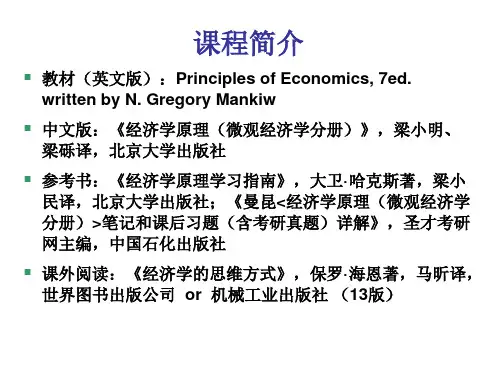
how firms decide how much to produce, how many workers to hire(企业决策:生产(数量)、雇佣工人数量)
how society decides how to divide its resources between national defense, consumer goods, protecting the environment, and other needs(国家决策:国防、消费品、环 4 TEN PRINCIPLES OF ECONOMICS 保等)
Tradeoff的原因本质是:资源的稀缺性
TEN PRINCIPLES OF ECONOMICS
6
HOW PEOPLE MAKE DECISIONS Principle #1: 人们面临权衡取舍 People Face Tradeoffs
Exampense requires resources that could
机会成本也来源于资源稀缺性,由于机会成本的存在从而需要取
舍。
机会成本是人们选择,而放弃其他全部选择中收益最大的部分。
9
HOW PEOPLE MAKE DECISIONS
Principle #2: 某种东西的成本是为了得到它而放弃的东西
The Cost of Something Is What You Give Up to Get It
TEN PRINCIPLES OF ECONOMICS
12
HOW PEOPLE MAKE DECISIONS
Principle #3: 理性人考虑边际量
Rational People Think at the Margin Rational people
曼昆-十大经济学原理,中英文对照
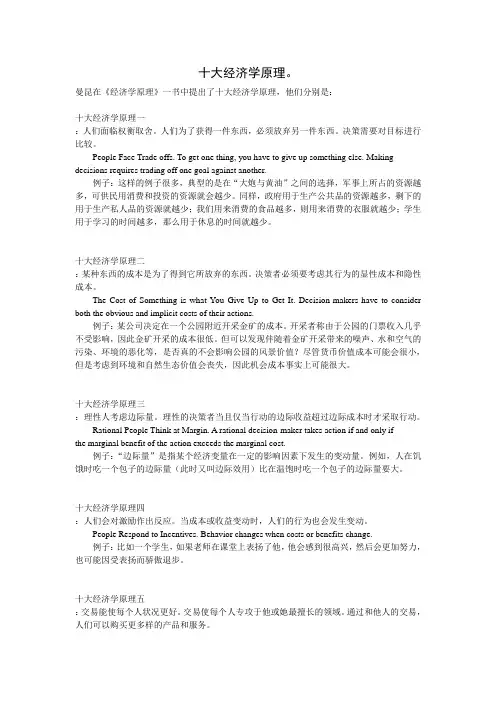
十大经济学原理。
曼昆在《经济学原理》一书中提出了十大经济学原理,他们分别是:十大经济学原理一:人们面临权衡取舍。
人们为了获得一件东西,必须放弃另一件东西。
决策需要对目标进行比较。
People Face Trade offs. To get one thing, you have to give up something else. Making decisions requires trading off one goal against another.例子:这样的例子很多,典型的是在“大炮与黄油”之间的选择,军事上所占的资源越多,可供民用消费和投资的资源就会越少。
同样,政府用于生产公共品的资源越多,剩下的用于生产私人品的资源就越少;我们用来消费的食品越多,则用来消费的衣服就越少;学生用于学习的时间越多,那么用于休息的时间就越少。
十大经济学原理二:某种东西的成本是为了得到它所放弃的东西。
决策者必须要考虑其行为的显性成本和隐性成本。
The Cost of Something is what You Give Up to Get It. Decision-makers have to consider both the obvious and implicit costs of their actions.例子:某公司决定在一个公园附近开采金矿的成本。
开采者称由于公园的门票收入几乎不受影响,因此金矿开采的成本很低。
但可以发现伴随着金矿开采带来的噪声、水和空气的污染、环境的恶化等,是否真的不会影响公园的风景价值?尽管货币价值成本可能会很小,但是考虑到环境和自然生态价值会丧失,因此机会成本事实上可能很大。
十大经济学原理三:理性人考虑边际量。
理性的决策者当且仅当行动的边际收益超过边际成本时才采取行动。
Rational People Think at Margin. A rational decision-maker takes action if and only ifthe marginal benefit of the action exceeds the marginal cost.例子:“边际量”是指某个经济变量在一定的影响因素下发生的变动量。
曼昆的十大经济学原理

曼昆的十大经济学原理曼昆(N. Gregory Mankiw)是一位知名的经济学家,他在其著作《宏观经济学原理》中提出了十大经济学原理,这些原理不仅对经济学领域有着重要的指导意义,也对我们理解经济运行规律有着重要的启示。
接下来,我们将逐一介绍这十大经济学原理。
第一条原理是“人们面临权衡取舍”。
这个原理告诉我们,在资源有限的情况下,人们需要在各种选择之间进行权衡取舍。
任何决策都意味着放弃其他选择,这就是经济学中的“机会成本”概念。
第二条原理是“某种东西的成本是为了得到它所放弃的东西”。
这一原理与第一条原理相呼应,它强调了机会成本的概念。
在做出决策时,我们需要考虑到放弃某种东西所带来的成本。
第三条原理是“理性人考虑边际量”。
边际量指的是一种额外的量,理性人会比较边际量与边际成本来做出决策。
这一原理对于理解人们的决策行为有着重要的启示作用。
第四条原理是“人们会对激励作出反应”。
激励是人们行为的重要驱动力,人们会对各种激励作出反应,这一原理对于理解市场经济中的行为有着重要的意义。
第五条原理是“贸易可以使每个人的状况都变得更好”。
贸易能够让每个人更好地利用自己的优势,从而实现互利互惠,这一原理是国际贸易理论的基础。
第六条原理是“市场通常是组织经济活动的一种好方法”。
市场机制能够有效地调节资源配置,实现资源的有效利用,这一原理是市场经济制度的基础。
第七条原理是“政府有时可以改善市场结果”。
尽管市场能够有效地调节资源配置,但有些时候政府的干预也是必要的,比如修正市场失灵和提供公共产品等。
第八条原理是“一国的生活水平取决于它生产物品和服务的能力”。
经济增长是提高生活水平的根本途径,这一原理强调了生产力的重要性。
第九条原理是“当政府发行了过多货币时,物价上升”。
通货膨胀是货币供应过多的结果,这一原理强调了货币政策对于通货膨胀的影响。
第十条原理是“社会面临通货膨胀和失业之间的短期权衡取舍”。
通货膨胀和失业之间存在一种短期的权衡取舍关系,这一原理对宏观经济政策的制定有着重要的指导意义。
曼昆的经济学十大原理
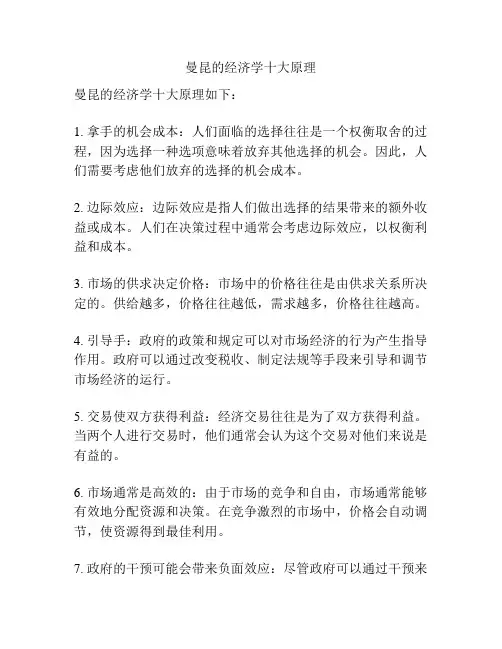
曼昆的经济学十大原理曼昆的经济学十大原理如下:1. 拿手的机会成本:人们面临的选择往往是一个权衡取舍的过程,因为选择一种选项意味着放弃其他选择的机会。
因此,人们需要考虑他们放弃的选择的机会成本。
2. 边际效应:边际效应是指人们做出选择的结果带来的额外收益或成本。
人们在决策过程中通常会考虑边际效应,以权衡利益和成本。
3. 市场的供求决定价格:市场中的价格往往是由供求关系所决定的。
供给越多,价格往往越低,需求越多,价格往往越高。
4. 引导手:政府的政策和规定可以对市场经济的行为产生指导作用。
政府可以通过改变税收、制定法规等手段来引导和调节市场经济的运行。
5. 交易使双方获得利益:经济交易往往是为了双方获得利益。
当两个人进行交易时,他们通常会认为这个交易对他们来说是有益的。
6. 市场通常是高效的:由于市场的竞争和自由,市场通常能够有效地分配资源和决策。
在竞争激烈的市场中,价格会自动调节,使资源得到最佳利用。
7. 政府的干预可能会带来负面效应:尽管政府可以通过干预来改善市场效果,但政府的干预也可能会带来负面效应。
政府的政策和行为可能会导致市场失灵和资源的浪费。
8. 在长期看,经济增长是关键:长期经济增长对于提高人民的生活水平和福利至关重要。
经济增长可以带来更多的就业机会和更好的社会福利。
9. 通货膨胀与失业之间存在长期权衡关系:经济中通常存在通货膨胀与失业之间的权衡关系。
政府可以通过货币政策来控制通货膨胀,但这可能导致增加失业率。
10. 社会保障是必要的:在市场经济中,一部分人可能无法通过市场获得基本的保障和福利。
因此,社会保障制度对于整个社会的稳定和公平至关重要。
曼昆经济学原理(双语)1.1
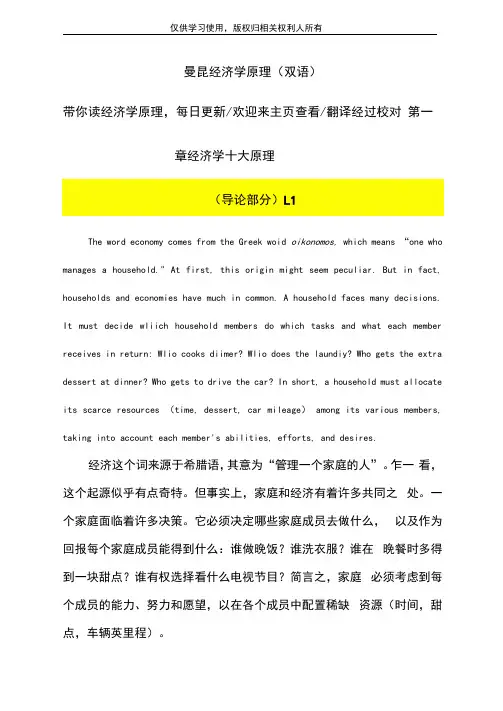
曼昆经济学原理(双语)带你读经济学原理,每日更新/欢迎来主页查看/翻译经过校对第一章经济学十大原理The word economy comes from the Greek woid oikonomos,which means “one who manages a household." At first, this origin might seem peculiar. But in fact, households and economies have much in common. A household faces many decisions. It must decide wliich household members do which tasks and what each member receives in return: Wlio cooks diimer? Wlio does the laundiy? Who gets the extra dessert at dinner? Who gets to drive the car? In short, a household must allocate its scarce resources (time, dessert, car mileage) among its various members, taking into account each member's abilities, efforts, and desires.经济这个词来源于希腊语,其意为“管理一个家庭的人”。
乍一看,这个起源似乎有点奇特。
但事实上,家庭和经济有着许多共同之处。
一个家庭面临着许多决策。
它必须决定哪些家庭成员去做什么,以及作为回报每个家庭成员能得到什么:谁做晚饭?谁洗衣服?谁在晚餐时多得到一块甜点?谁有权选择看什么电视节目?简言之,家庭必须考虑到每个成员的能力、努力和愿望,以在各个成员中配置稀缺资源(时间,甜点,车辆英里程)。
曼昆经济学原理(双语)1.2
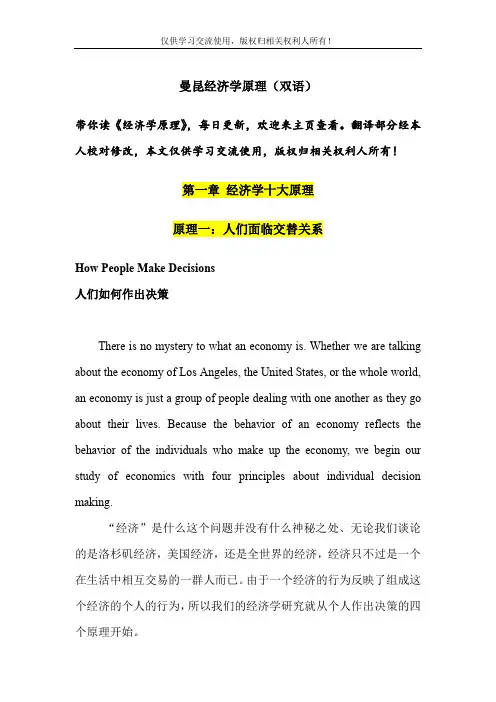
曼昆经济学原理(双语)带你读《经济学原理》,每日更新,欢迎来主页查看。
翻译部分经本人校对修改,本文仅供学习交流使用,版权归相关权利人所有!第一章经济学十大原理原理一:人们面临交替关系How People Make Decisions人们如何作出决策There is no mystery to what an economy is. Whether we are talking about the economy of Los Angeles, the United States, or the whole world, an economy is just a group of people dealing with one another as they go about their lives. Because the behavior of an economy reflects the behavior of the individuals who make up the economy, we begin our study of economics with four principles about individual decision making.“经济”是什么这个问题并没有什么神秘之处、无论我们谈论的是洛杉矶经济,美国经济,还是全世界的经济,经济只不过是一个在生活中相互交易的一群人而已。
由于一个经济的行为反映了组成这个经济的个人的行为,所以我们的经济学研究就从个人作出决策的四个原理开始。
Principle 1: People Face Trade-offs原理一:人们面临取舍You may have heard the old saying, “There ain’t no such thing as a free lunch.” Grammar aside, there is much truth to this adage. To get something that we like, we usually have to give up something else that we also like. Making decisions requires trading off one goal against another.您可能听过一句老话:“没有免费的午餐。
曼昆经济学原理(双语)1.5
曼昆经济学原理(双语)带你读《经济学原理》,每日更新,欢迎来主页查看。
翻译部分经本人校对修改,本文仅供学习交流使用,版权归相关权利人所有!第一章经济学十大原理原理四Principle 4: People Respond to Incentives原理四:人们会对激励作出反应An incentive is something (such as the prospect of a punishment or reward) that induces a person to act. Because rational people make decisions by comparing costs and benefits, they respond to incentives. You will see that incentives play a central role in the study of economics. One economist went so far as to suggest that the entire field could be summarized as simply “People respond to incentives. The rest is commentary.”激励是指诱使或迫使人们做某事的东西(例如可能的惩罚或奖励)。
由于理性人在决策时比较边际成本和边际收益,他们对激励作出反应。
你将看到激励在经济学的学习中占有核心地位。
某个经济学家甚至说,整个经济学可以简单总结为“人们对激励作出反应,剩下的内容只是对该原理的解释。
”Incentives are key to analyzing how markets work. For example, when the price of an apple rises, people decide to eat fewer apples. At the same time, apple orchards decide to hire more workers and harvest more apples. In other words, a higher price in a market provides an incentive for buyers to consume less and an incentive for sellers to produce more. As we will see, the influence of prices on the behavior of consumers and producers is crucial to how a market economy allocates scarce resources.激励在分析市场如何运行时十分重要。
曼昆 经济学原理
曼昆的《经济学原理》中,归纳出经济学十大原理。
这十大原理是:1、人们面临权衡取舍。
这表明经济学是研究资源稀缺条件下的选择问题。
2、某种东西的成本是为了得到它所放弃的东西。
经济学中最重要的一个概念——机会成本。
3、理性的人考虑边际量。
经济学中最重要的分析方法——边际分析法。
4、人们会对激励作出反应。
经济学分析的背景——制度决定人们的行为,要用制度来引导与约束人们的行为。
这四条是关于个人如何做出决策的四个原理。
市场经济的组成单位是个人,个人有决策(做出选择)的自由。
个人组成整体。
经济学研究的出发点是个人行为。
这四条原理说明了如何研究个人行为。
5、贸易能使每个人状况更好。
人与人的关系本质上是交易关系,这种关系之所以产生是因为贸易是双赢的,无论对个人还是国家都如此。
6、市场通常是组织经济活动的一种好方法。
市场经济的基本原则是“看不见的手”调节每个人的经济活动,“看不见的手”就是价格。
市场机制调节是经济学的基本内容。
7、政府有时可以改善市场结果。
市场经济需要法治,同时市场也有失灵。
政府的作用是补充市场机制之不足。
这三个原理是市场经济的基本原则,也是微观经济学所要论述的问题。
8、一国的生活水平取决于它生产物品与劳务的能力。
决定一国整体状况的是其生产能力,这是分析整体经济的中心。
9、当政府发行了过多货币时,物价上升。
现代经济是货币经济,货币与物价的关系是经济学家一直关注的。
10、社会面临通货膨胀与失业之间的短期权衡取舍。
这是短期中整体经济的中心问题,也是政府调节的难点。
原理一:人们面临权衡取舍当人们组成社会时,他们面临各种不同的权衡取舍。
典型的是在“大炮与黄油”之间的选择。
在现代社会里,同样重要的是清洁的环境和高收入水平之间的权衡取舍。
认识到人们面临权衡取舍本身并没有告诉我们,人们将会或应该做出什么决策。
然而,认识到生活中的权衡取舍是重要的,因为人们只有了解了他们面临的选择,才能做出良好的决策。
原理二:某种东西的成本是为了得到它所放弃的东西一种东西的机会成本(opportunitycost)是为了得到这种东西所放弃的东西。
经济学原理第1章经济学十大原理
• 或者:机会成本是指一定生产要素被用 于生产某种产品时所放弃的、用于生产 另一种产品时可能获得的最大收益。机 会成本又称为经济成本。
25
理解机会成本的关键
• 衡量生产一种产品的机会成本必须在生 产另一种产品的收益中衡量,并且必须 是最大可能收益。
40
市场配置资源案例2
比亚迪如何击败日本电池帝国
• 1995年以来,比亚迪在镍镉、镍氢和锂电池三个战场 上,将东芝、松下、三洋等日本电池制造商打得节节 败退。2001年,比亚迪将镍镉、镍氢和锂电池的市场 份额分别做到了世界第二、第三和第四位。
• 1998年,先是世界上最大的电动玩具制造商、日本的 Nikko公司将比亚迪作为他们的电池供应商,同年,世 界上最大的无绳电话制造商V-tech成了比亚迪的客户。 1990、2000年,比亚迪势如破竹,大客户名单上添上 了无绳电话制造商松下、索尼、GE、AT&T、Uniden, 电动工具商Ryobi、Craftsman和业界老大TTI。
环境保护建设 • 对贡献更大的员工发放更多的奖励,并给予更多的股
权 • 向穷人发放救济
政府是采取“效率优先,兼顾公平”还是“公平优先, 兼顾效率”,还是“效率与公平并重”,最终将决定 资源在全社会的分配。
24
原理二:所得等于所失
• 由于上大学而造成的可能损失前面已经 计算过了,它涉及到的是机会成本。
36
对市场经济的评价-优点
• 市场经济自发起作用,不需要昂贵和复 杂的官僚机构来协调做出经济决策,市 场机制能对变化的需求和供给情况迅速 做出反应,以便把资源配置到最需要它 们的地方。
37
经济学十大原理—英文版
Principle 1: People Face Trade-offs
The first lesson about making decisions is summarized in the adage “There is no such thing as a free lunch.” To get one thing that we like, we usually have to give up another thing that we like. Making decisions requires trading off one goal against another.
Although the study of economics has many facets, the field is unified by several central ideas. In this chapter, we look at Ten Principles of Economics. Don’t worry if you don’t understand them all at first or if you don’t find them completely convincing. In later chapters, we will explore these ideas more fully. The ten principles are introduced here to give you an overview of what economics is all about. You can think of this chapter as a “preview of coming attractions.”
- 1、下载文档前请自行甄别文档内容的完整性,平台不提供额外的编辑、内容补充、找答案等附加服务。
- 2、"仅部分预览"的文档,不可在线预览部分如存在完整性等问题,可反馈申请退款(可完整预览的文档不适用该条件!)。
- 3、如文档侵犯您的权益,请联系客服反馈,我们会尽快为您处理(人工客服工作时间:9:00-18:30)。
Marginal changes are small, incremental adjustments to an existing plan of action.
People make decisions by comparing costs and benefits at the margin.
Guns v. butter Food v. clothing Leisure time v. work Efficiency v. equity Making decisions requires trading off one goal against another.
1. People face tradeoffs. Efficiency v. Equity
1. People face tradeoffs.
"There is no such thing as a free lunch! lunch!"
1. People face tradeoffs.
To get one thing, we usually have to give up another thing.
7. Governments can sometimes improve market outcomes.
Market failure may also be caused by market power, which is the ability of a single person or firm to unduly influence market prices.
7. Governments can sometimes improve market outcomes.
When the market fails (breaks down) government can intervene to promote efficiency and equity.
7. Governments can sometimes improve market outcomes. Market failure occurs when the market fails to allocate resources efficiently.
. . . The word economy comes from a Greek word for "one who manages a household."
A household and an economy face many decisions:
Who will work? What goods and how many of them should be produced? What resources should be used in production? At what price should the goods be sold?
2. The cost of something is what you give up to get it.
Decisions require comparing costs and benefits of alternatives.
Whether to go to college or to work? Whether to study or go out on a date? Whether to go to class or sleep in?
7. Governments can sometimes improve market outcomes.
Market failure may be caused by an externality, which is the impact of one person or firm's actions on the well-being of a bystander.
A Lecture Presentation in PowerPoint to Accompany
Principles of Economics
Second Edition by
N. Gregory Mankiw
Ten Principles of Economics
r 1
Economy. . .
6. Markets are usually a good way to organize economic activity.
Adam Smith made the observation that households and firms interacting in markets act as if guided by an "invisible hand."
Economics
Economics is the study of how society manages its scarce resources.
Economists study. . .
How people make decisions. How people interact with each other. The forces and trends that affect the economy as a whole.
4. People respond to incentives.
Marginal changes in costs or benefits motivate people to respond. The decision to choose one alternative over another occurs when that alternative's marginal benefits exceed its marginal costs!
8. The standard of living depends on a country's production.
Standard of living may be measured in different ways:
By comparing personal incomes. By comparing the total market value of a nation's production.
5. Trade can make everyone better off.
People gain from their ability to trade with one another. Competition results in gains from trading. Trade allows people to specialize in what they do best.
2. The cost of something is what you give up to get it. The opportunity cost of an item is what you give up to obtain that item.
3. Rational people think at the margin.
4. People respond to incentives.
LA Laker basketball star Kobe Bryant chose to skip college and go straight to the NBA from high school when offered a $10 million contract.
6. Markets are usually a good way to organize economic activity.
In a market economy, households decide what to buy and who to work for. Firms decide who to hire and what to produce.
Ten Principles of Economics
How People Make Decisions
People face tradeoffs. The cost of something is what you give up to get it. Rational people think at the margin. People respond to incentives.
8. The standard of living depends on a country's production.
Almost all variations in living standards are explained by differences in countries' productivities.
Ten Principles of Economics
How the Economy as a Whole Works
The standard of living depends on a country's production. Prices rise when the government prints too much money. Society faces a short-run tradeoff between inflation and unemployment.
